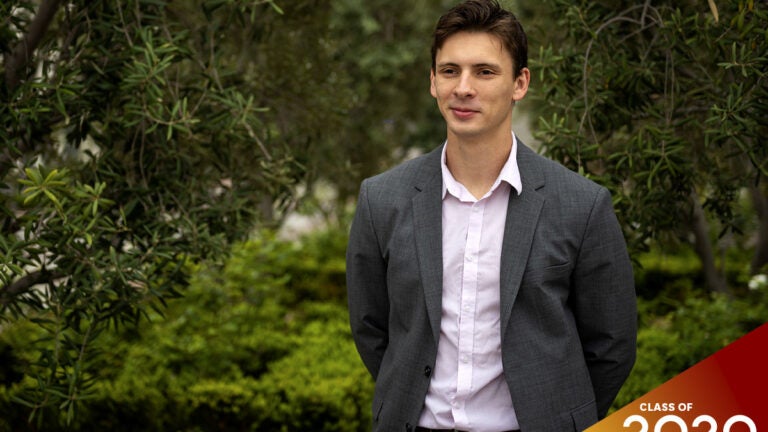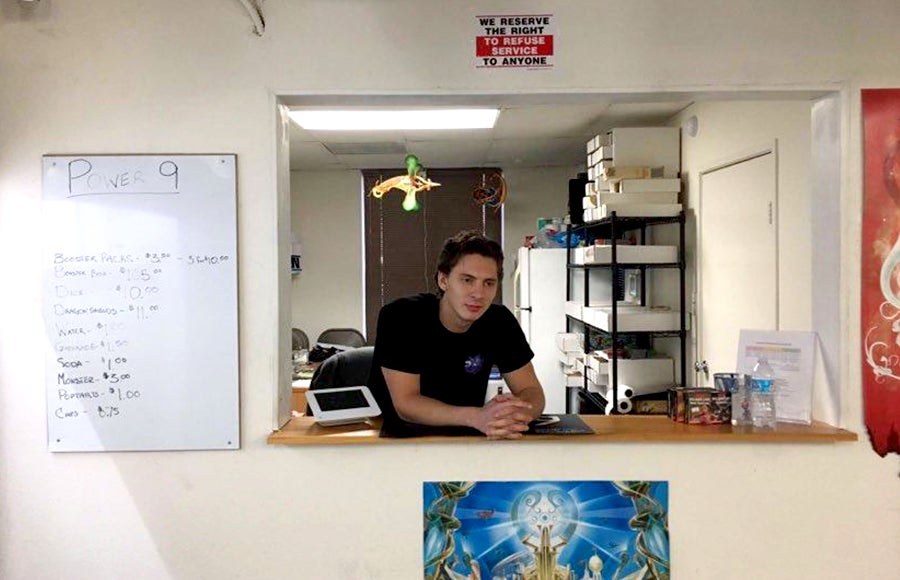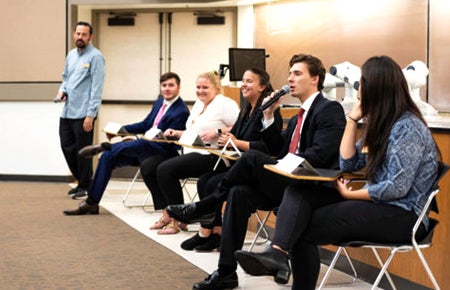
Once homeless, USC Dornsife grad uses grit and determination to pursue his dreams
After yet another morning tinged with the smell of whiskey and coffee on his father’s breath, Nicholas Chapman left home to live on the streets. He had finally had enough of the screaming matches, enough of the strict rules.
Chapman grabbed his cell phone. A friend gave him a backpack, $20, a change of clothes and some deodorant. With that, he became one of the thousands in Southern California who have no place to call home.
He was only 17.
But he felt hopeful. He was leaving an unhealthy environment, and he had a vague plan for his future: getting an education.
Eight years later, he is graduating from USC Dornsife College of Letters, Arts and Sciences and plans to become a doctor. His road to get here has been rocky. He just wants to do everything in his power to protect others from similar hardships.
“I know how it is to almost fall through the cracks, the fear as if you will lose everything,” Chapman said. “I decided I didn’t want to ever have anyone else have that feeling of losing their life, so conserving lives is my idea.”
Early obstacles to a health care career
The 25-year-old graduates this month with a bachelor’s degree in neuroscience from USC Dornsife. Medical school is up next.
“I want to put a mask on and help a person, then take the mask off and also help a person. Advocacy will always be a part of what I do.”

Opening a hobby and gaming store in Long Beach helped Nicholas Chapman save enough to buy a car and rent an apartment. (Photo: Courtesy of Nicholas Chapman.)
It’s a lesson he learned at a young age from his mother. The two left the United States for her native Brazil when Chapman was 2. She struggled to find work and would tell her young son that education was his best path out of poverty.
Seeing no way forward in Brazil, she encouraged him to return to the U.S. He moved in with his American father in Long Beach, California, at age 14.
Chapman had to learn to read and write in English as a teenager. He hid his struggles from teachers and peers, taking strategic bathroom breaks to avoid reading out loud in class.
Then there was the strained relationship with his dad, who is an alcoholic.
He also talks honestly about when he got caught sneaking out. His dad had grounded him already over another issue, and no end to the punishment was in sight. Chapman decided it was time he left for good.
“I stayed in Metro stations. I stayed in homeless shelters. I stayed on friends’ couches,” he said.
Although he had dropped out of high school, Chapman remembered his mother’s advice: Get an education. He visited a $1 bookstore, where he pored over economics textbooks for hours. He earned his GED, then enrolled in classes at Long Beach City College.
He did well at first, but lack of sleep and the constant grind of day-to-day survival caught up quickly. His grades slipped. “My 4.0 went to a 1.7, just like that,” he said.
A mission to study medicine
Then at age 19, stability came in the form of a part-time job at a mom-and-pop hobby store. He sharpened his sales skills and soon became a manager. His grades recovered.
A year later, the store closed. But Chapman had saved some money and made friends with a few regular customers. They launched their own hobby shop, with Chapman as CEO. He soon could afford a car, then a rented room in an apartment.
Although he felt secure in his personal life, his business and economics classes left him uninspired. Then one day, the uncle of a boy he tutored had an epileptic seizure in front of his family and Chapman. Chapman felt shocked and helpless.
“I went to that $1 bookstore, grabbed a human biology textbook and read all about the nervous system,” he said. “That’s when I started falling in love.”
He switched his major from economics to psychology. He planned to transfer to the University of California system or USC, with the goal of applying to medical school. But his academic counselor said with the string of poor grades early in his college career, he had no chance.

Nicholas Chapman, 2nd from right, speaks during a panel for incoming transfer students at USC in 2018. (Photo: Eric Lindberg.)
Chapman applied anyway, relying on advice from a USC admissions adviser. He got into three UC schools and USC Dornsife, and he enrolled as a Trojan in Spring 2018.
Giving others a better life through medicine
Now, as he moves into the next phase of his life, with medical school planned for Fall 2021, Chapman took time to look back on his experiences.
“My life has been about survival and lost innocence,” he said. “Working at Children’s Hospital, you see that same innocence diminish when kids realize they are going to die. It’s the same innocence you see lost when a transfer student comes in and struggles. I lost that innocence at a young age, being on the streets.”
If Chapman achieves his goal of becoming a doctor, he feels he will have gained resources and credibility that he can use to help others. And perhaps sharing his past will give someone the courage or persistence they need to survive.
“There’s some kid out there on the streets crying in fear, or getting abused by their parents, or unable to have an education,” he said. “I want them to see my story and realize that they can push through, that they should conserve life and believe in themselves.”